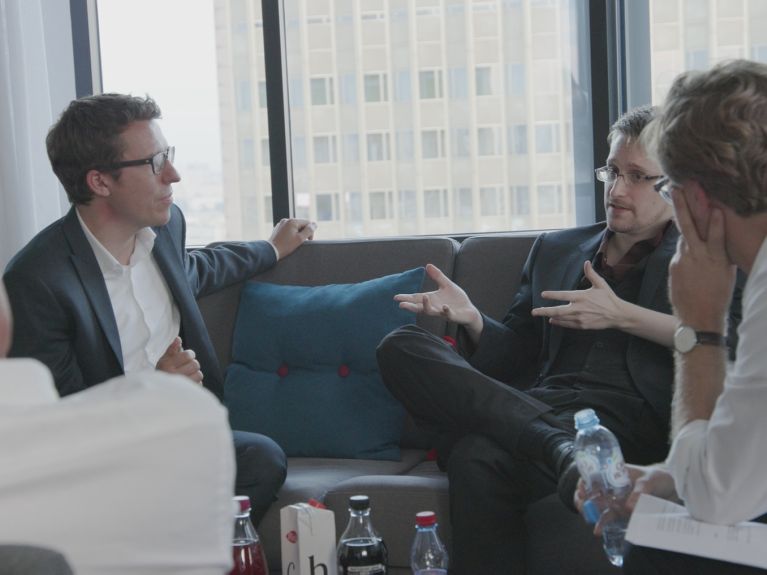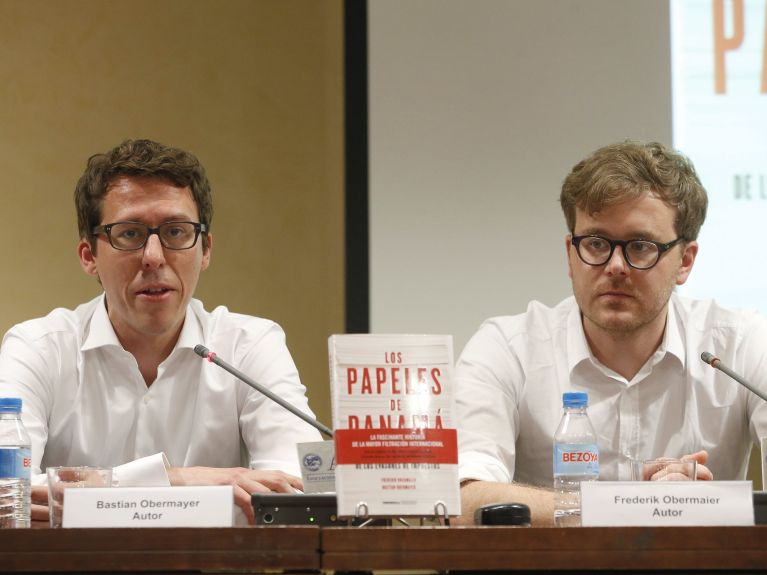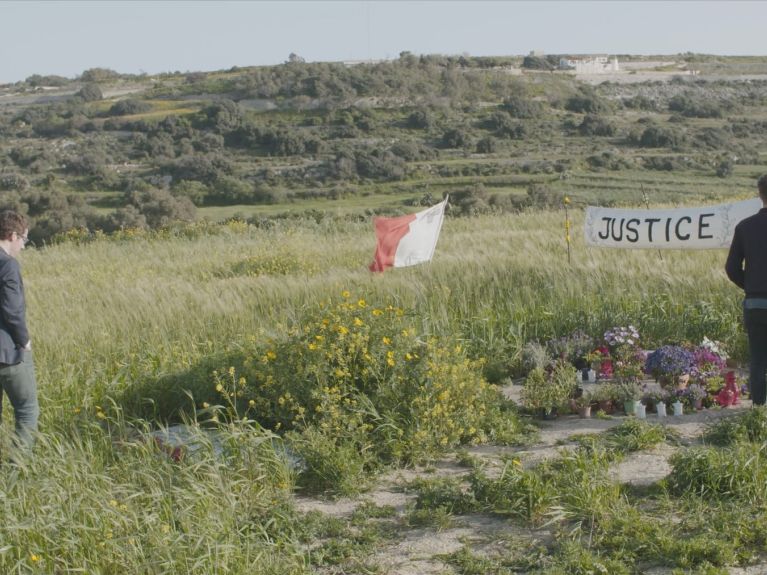“We need to talk more about the freedom of the press”
In a documentary film, renowned German investigative journalists give insight into their work. And here they tell us why.

Panama Papers, Paradise Papers, Ibiza affair – many of the major journalistic revelations of recent years are linked to the names Bastian Obermayer and Frederik Obermaier. The two journalists from the Süddeutsche Zeitung (SZ) have won numerous awards for their research, including the Pulitzer Prize. The documentary film 'Behind the Headlines' by Daniel Sager, released in May 2021, now provides unusually deep insights into their work.

Mr Obermaier, Mr Obermayer, what was it like for you as investigative journalists who carry out research in the background to suddenly become protagonists yourself?
Frederik Obermaier: It wasn't an easy decision for us to participate in a film project like this. Our main worry was a possible threat to our sources. Ultimately, we were persuaded by the argument that we're living at a time when journalism can't be explained often enough and transparently enough. For example, there is this idea that journalists receive an explosive piece of information and post it on the net just a few minutes later. In reality, before we publish, we go through a long process of reviewing and questioning during which we, of course, also always give the side we are reproaching an opportunity to put their point of view.
The impression you get in the film is very sober, withdrawn, almost devoid of emotion. Yet in the meantime, investigative reporting has also become part of entertainment formats. We are thinking of comedians like the American John Oliver or the German Jan Böhmermann. What are your views on this?
Bastian Obermayer: I think the mixture of investigation and entertainment works very well in those kind of shows and I have a high opinion of them – also because they reach a big audience. Of course, the drier subjects have a tougher time in a show, but basically any investigation can be incredibly entertaining if it's really well presented. If you take advantage of the fact that you can amaze people with it. And that's what we're trying to do – we want people to say "Wow!" after reading our stuff. I even believe that this amazement at a grievance, at its significance, at the magnitude of the problem, is necessary to generate enough attention at all in an age when everyone is constantly distracted.
In our research we think in terms of weeks, months, even yearly cycles.
It's just that your methods are very different from those of entertainment shows, aren't they?
Frederik Obermaier: I think with their more emotional, upbeat performance they reach a different audience than we do with our more withdrawn style. This also means that we work comparatively slowly. Although we're employed by a daily newspaper, in our research we tend to think in terms of weeks, months, even yearly cycles. Because we know we need this amount of time to fully research and present a topic.
Editors who spend years researching – a medium has to be able to afford that!
Bastian Obermayer: These days, many colleagues are under enormous time pressure and actually have no more capacity for investigative research. On the other hand, investigative departments are being set up in many places because the media have realized that it's increasingly a unique selling point whether you can research things thoroughly or not. We're happy to have these working conditions at SZ.
Dieses YouTube-Video kann in einem neuen Tab abgespielt werden
YouTube öffnenThird party content
We use YouTube to embed content that may collect data about your activity. Please review the details and accept the service to see this content.
Open consent formYet this idea of competition is perhaps no longer in keeping with the times anyway, is it? Many of the most important investigations of the past years wouldn't have been possible without the cooperation between actually rival media houses – above all the Panama Papers, which were leaked to your department first.
Frederik Obermaier: A research project like the Panama Papers with over eleven million documents really couldn't have been managed by anyone on their own, not even global media corporations like CNN. This is one of the reasons why there has been a trend towards cooperation in recent years. Journalists are looking for collaboration; the image of the lone wolf has been replaced by a power-of-the-pack mentality. After all, cross-border problems are best tackled with a cross-border team. I think it's fantastic how many revelations have been and are made possible this way. In the future, however, it would be important to bring more journalists from emerging economies into these teams. At the moment, the networks are still very strongly based in the Western world.
We don't measure our stories by the way they might be appreciated later.
Whistleblower Edward Snowden, who makes a brief appearance in the film, calls the Panama Papers disclosures groundbreaking. Do you always have the potential impact in mind when doing your research?
Bastian Obermayer: We try not to measure our stories by the appreciation they may receive later. We point out a grievance – we're not responsible for the reactions to it. But it's true: I don't know of any research that has had a greater concrete impact than the Panama Papers, simply because they affected so many countries: from resignations and arrests of government leaders to further investigations and new laws to stop money laundering. By the way, the Ibiza affair totally surprised us in terms of its effect. We hadn't expected so many reactions – the day after publication, thousands of people were already demonstrating in front of the Austrian seat of government. Right-wing populist and vice-chancellor Heinz-Christian Strache had to resign and new elections were called. But you can't and shouldn't count on that sort of thing.

The greater the potential impact of a story, the more dangerous it can be for the journalists working on it. In October 2017, one of your colleagues, journalist Daphne Caruana Galizia, was killed by a car bomb in Malta.
Frederik Obermaier: Unfortunately, it has long been the case that many of our international colleagues face threats on a daily basis. Daphne's dreadful murder has shown that we need to talk more about the freedom of the press and how we can defend it. For example, when heads of state call journalists the enemies of society. This is verbally preparing the ground for violence. It's a terrible development that we must confront unequivocally as journalists and as a society.



